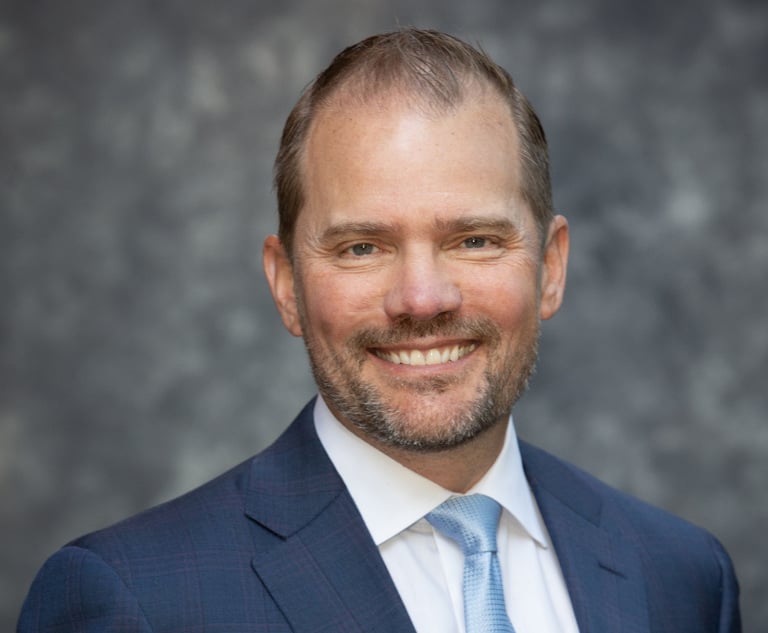 Michael B. Terry (left) of Bondurant Mixson & Elmore and Edward H. Wasmuth, Jr. of Smith, Gambrell & Russell. (Courtesy photos)
Michael B. Terry (left) of Bondurant Mixson & Elmore and Edward H. Wasmuth, Jr. of Smith, Gambrell & Russell. (Courtesy photos)Lawyers for Man Molested by Priest Decades Ago Ask Appeals Court to Revive Tossed Case
'Philip Doe' sued the Archdiocese of Atlanta in 2018 over claims that a now-deceased Catholic priest molested him at a Dalton church in the late 1970s.
June 16, 2020 at 03:08 PM
5 minute read
The lawyer for a man whose lawsuit against the Archdiocese of Atlanta claiming that a priest repeatedly molested him more than 30 years ago was thrown out on statute of limitation grounds asked the Georgia Court of Appeals to revive the case Tuesday.
The priest responsible for the abusing "Philip Doe" died in 1997, but it was only after then-Atlanta Archbishop Wilton Gregory released a list of more than a dozen priests and seminarians "credibly accused" of sexually abusing minors in 2018 that Doe came forward with claims of having been molested as an altar boy.
His lawsuit naming the archdiocese, Gregory and St. Joseph's Catholic Church in Dalton, where the alleged abuse occurred, was dismissed last year.
Ruling on a motion to dismiss, Cobb County Superior Court Judge A. Gregory Poole said the claims, including fraud, negligence, maintaining a public nuisance and breach of fiduciary duty, were barred by the statute of limitations.
Doe's attorney, Michael Terry, said the trial judge had erred in dismissing the claims because the two-year statute was tolled by the archdiocese's actions in abetting Father J. Douglas Edwards' many years of abusing Doe and other youths entrusted to his care.
"This is a lawsuit against the archdiocese for hiring and retaining a priest who was known to be a pedophile," said Terry, of Bondurant, Mixson & Elmore.
Rather than do something about it, the archdiocese just moved Edwards from church to church, said Terry, pointing to a list of transfers "that facilitated the molestation by bringing him into contact with new victims."
In doing so, he said, the archdiocese itself had committed fraud by hiding from Doe and others its knowledge Edwards was a serial sex abuser.
"This is not a suit against the molester," said Terry, but against the church and officials that protected him and directed young boys to serve under him.
"The sun never sets on fraud," said Terry, citing the Court of Appeals 1988 opinion in Hill v. Fordham, 186 Ga. App. 354.
"Is there someone else at the church who was directing Philip Doe to do these things?" asked Judge Ken Hodges.
"They're all agents and employees of the church," said Terry, who represents Doe with firm associate Jane Vincent and Penn Law's Darren Penn and Alexandra "Sachi" Cole.
Representing the archdiocese and Gregory (who now serves as archbishop of Washington, D.C.) Smith Gambrell & Russell partner Edward Wasmuth said the courts have consistently held that statute of limitation and repose must be honored, even if the result is "an extremely harsh limitation" on a plaintiff's ability to file a claim.
"There's nothing unique in this case," he said.
Doe's alleged molestation took place in the late 1970s when he was between 13 and 15. As a minor at the time, under Georgia law he had two years after he turned 18—the age of majority—to bring his claims, Wasmuth said.
But Doe remained silent for decades, he said.
"There was no communication with the church for over 30 years; 36 years of nothing," he said.
Hodges asked why the fraud claims weren't tolled by the church's purported concealment of Edwards' activities, Wasmuth said the victim was well aware of them.
"At the point where he's abused, he knows the truth; he knows enough to pursue a claim for his injury," he said.
"But he didn't know that the Catholic Church knew altar boys were being molested by this man, and instead of taking action they just moved him around," said Presiding Judge Sara Doyle.
"That's irrelevant," replied Wasmuth, hypothesizing a case involving himself being involved in an auto accident with a truck.
"If I'm involved in a traffic accident, my claim accrues today," he said, and no knowledge about the trucking is necessary to pursue that claim.
"But the trucking company isn't taking action to hide its activities," Doyle said.
"The argument here is that the church actively hid its knowledge and was aiding and abetting all these years," she said.
"At the point he's abused, he knows what happened," said Wasmuth. "The fact that others knew is irrelevant to his claim."
"The allegation is that the church knew very well that this man was dangerous, but [Doe] didn't," said Judge Christopher Doyle. "He knows he has a claim against this priest … he doesn't know he has a viable claim against this institution."
"He can't sit around for 36 years and do nothing," said Wasmuth, noting that it was the church's decision to identify its sexual predators in 2018 that led Doe to file the suit to begin with.
This content has been archived. It is available through our partners, LexisNexis® and Bloomberg Law.
To view this content, please continue to their sites.
Not a Lexis Subscriber?
Subscribe Now
Not a Bloomberg Law Subscriber?
Subscribe Now
NOT FOR REPRINT
© 2024 ALM Global, LLC, All Rights Reserved. Request academic re-use from www.copyright.com. All other uses, submit a request to [email protected]. For more information visit Asset & Logo Licensing.
You Might Like
View All
Lawyers Can Live Worthy of the Calling They Have Received and The Gifts With Which They Have Been Blessed

Atlanta-Based Fearless Fund Ends Black-Only Entrepreneurial Grant Contest After Settling Civil Rights Lawsuit

Can You Contract Away Your Right to Leave Bad Google Reviews? Court of Appeals Set to Decide

Law Firms Mentioned
Trending Stories
- 1Former McCarter & English Associate Fired Over 'Gangsta Rap' LinkedIn Post Sues Over Discrimination, Retaliation
- 2First-of-Its-Kind Parkinson’s Patch at Center of Fight Over FDA Approval of Generic Version
- 3The end of the 'Rust' criminal case against Alec Baldwin may unlock a civil lawsuit
- 4Solana Labs Co-Founder Allegedly Pocketed Ex-Wife’s ‘Millions of Dollars’ of Crypto Gains
- 5What We Heard From Litigation Leaders This Year
Who Got The Work
Michael G. Bongiorno, Andrew Scott Dulberg and Elizabeth E. Driscoll from Wilmer Cutler Pickering Hale and Dorr have stepped in to represent Symbotic Inc., an A.I.-enabled technology platform that focuses on increasing supply chain efficiency, and other defendants in a pending shareholder derivative lawsuit. The case, filed Oct. 2 in Massachusetts District Court by the Brown Law Firm on behalf of Stephen Austen, accuses certain officers and directors of misleading investors in regard to Symbotic's potential for margin growth by failing to disclose that the company was not equipped to timely deploy its systems or manage expenses through project delays. The case, assigned to U.S. District Judge Nathaniel M. Gorton, is 1:24-cv-12522, Austen v. Cohen et al.
Who Got The Work
Edmund Polubinski and Marie Killmond of Davis Polk & Wardwell have entered appearances for data platform software development company MongoDB and other defendants in a pending shareholder derivative lawsuit. The action, filed Oct. 7 in New York Southern District Court by the Brown Law Firm, accuses the company's directors and/or officers of falsely expressing confidence in the company’s restructuring of its sales incentive plan and downplaying the severity of decreases in its upfront commitments. The case is 1:24-cv-07594, Roy v. Ittycheria et al.
Who Got The Work
Amy O. Bruchs and Kurt F. Ellison of Michael Best & Friedrich have entered appearances for Epic Systems Corp. in a pending employment discrimination lawsuit. The suit was filed Sept. 7 in Wisconsin Western District Court by Levine Eisberner LLC and Siri & Glimstad on behalf of a project manager who claims that he was wrongfully terminated after applying for a religious exemption to the defendant's COVID-19 vaccine mandate. The case, assigned to U.S. Magistrate Judge Anita Marie Boor, is 3:24-cv-00630, Secker, Nathan v. Epic Systems Corporation.
Who Got The Work
David X. Sullivan, Thomas J. Finn and Gregory A. Hall from McCarter & English have entered appearances for Sunrun Installation Services in a pending civil rights lawsuit. The complaint was filed Sept. 4 in Connecticut District Court by attorney Robert M. Berke on behalf of former employee George Edward Steins, who was arrested and charged with employing an unregistered home improvement salesperson. The complaint alleges that had Sunrun informed the Connecticut Department of Consumer Protection that the plaintiff's employment had ended in 2017 and that he no longer held Sunrun's home improvement contractor license, he would not have been hit with charges, which were dismissed in May 2024. The case, assigned to U.S. District Judge Jeffrey A. Meyer, is 3:24-cv-01423, Steins v. Sunrun, Inc. et al.
Who Got The Work
Greenberg Traurig shareholder Joshua L. Raskin has entered an appearance for boohoo.com UK Ltd. in a pending patent infringement lawsuit. The suit, filed Sept. 3 in Texas Eastern District Court by Rozier Hardt McDonough on behalf of Alto Dynamics, asserts five patents related to an online shopping platform. The case, assigned to U.S. District Judge Rodney Gilstrap, is 2:24-cv-00719, Alto Dynamics, LLC v. boohoo.com UK Limited.
Featured Firms
Law Offices of Gary Martin Hays & Associates, P.C.
(470) 294-1674
Law Offices of Mark E. Salomone
(857) 444-6468
Smith & Hassler
(713) 739-1250






